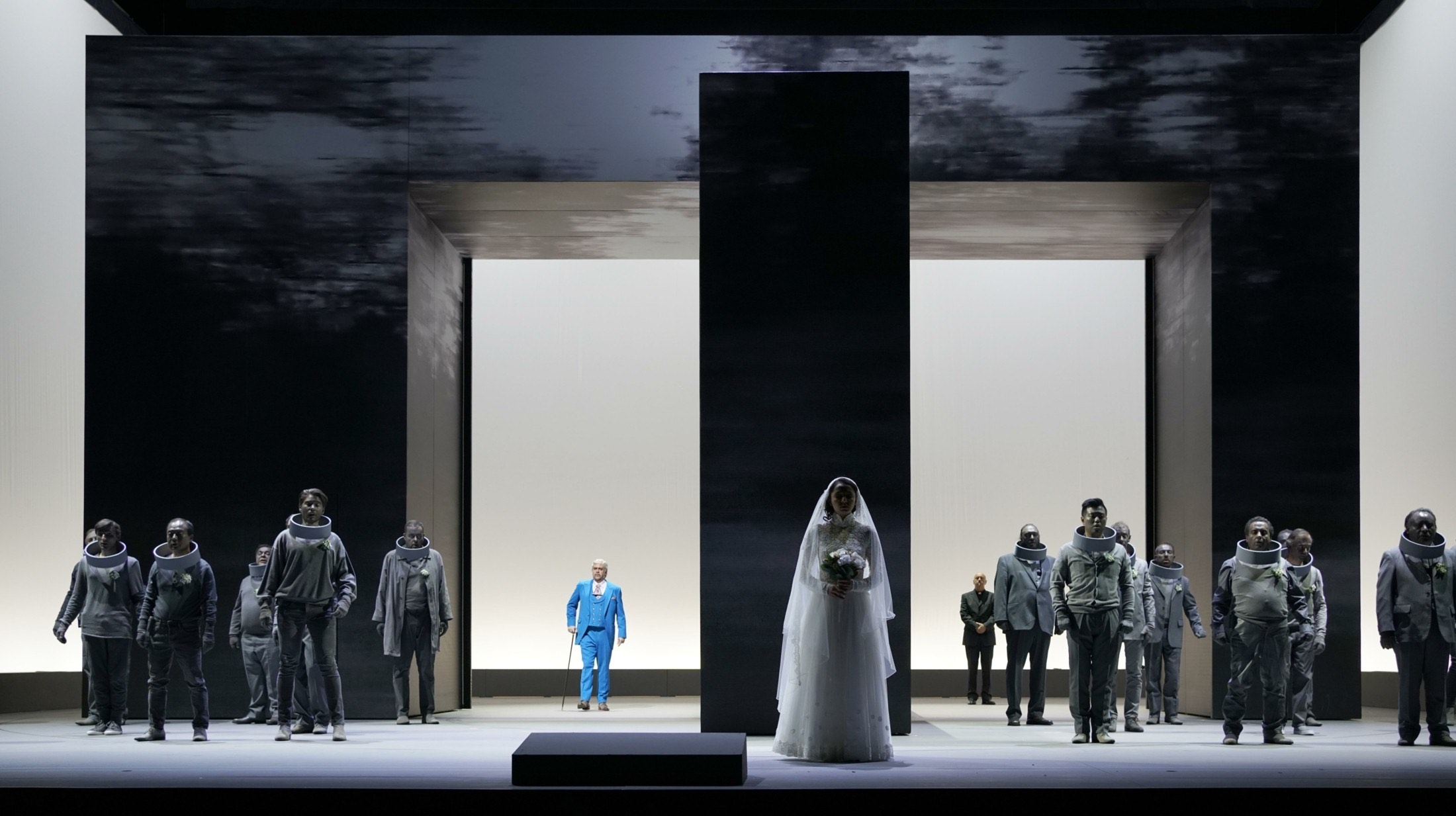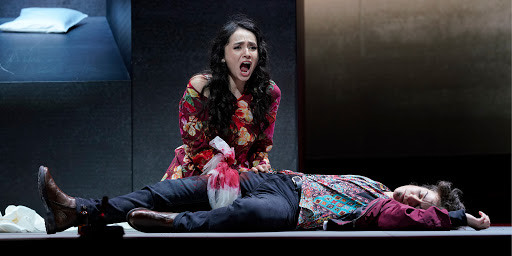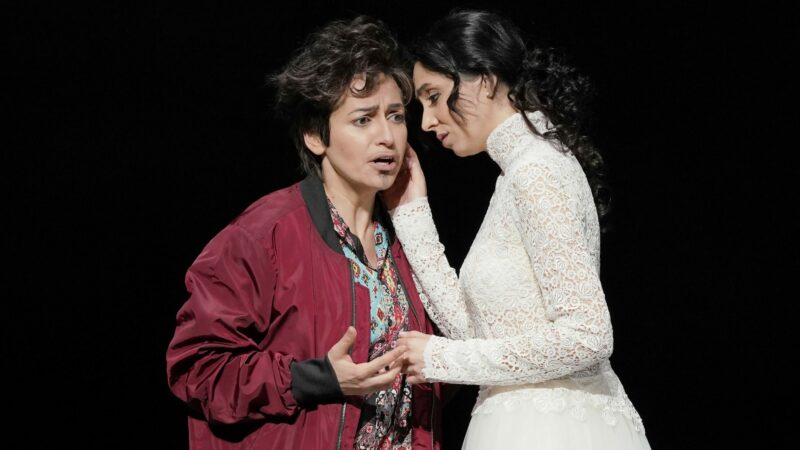LINZ: I Capuleti e i Montecchi – Vincenzo Bellini, 9 giugno 2021
I Capuleti e i Montecchi
opera in due atti con musica di Vincenzo Bellini su libretto di Felice Romani
prima assoluta al Teatro La Fenice di Venezia l’11 marzo 1830
Direttore Enrico Calesso
Regia Gregor Horres
Personaggi e Interpreti:
- Romeo Anna Alas i Jové
- Giulietta Ilona Revolskaya
- Tebaldo Mathias Frey
- Lorenzo Michael Wagner
- Capellio Dominik Nekel
Costumi Yvonne Forster
Scene Elisabeth Pedross
Video Jonatan Salgado Romero
Coreografia Ilja van den Bosch
Drammaturgo Katharina John
Orchestra Bruckner Orchestre Linz
Coro Chor des Landestheaters Linz
Maestro del coro Elena Pierini
Landestheater Linz 9 giugno 2021
It has been a very particular season in the world of the opera. Very sad and lonely – theatres without an audience… theatres without performances… society without a theatre… deprived of art, music, poetry. Society that dwells only on its physiological necessities… Making something artistically fulfilling in these times became a great challenge for the theatre, where the art is created in teams and togetherness is the only way of expressing its essence. Difficult time pushed the boundaries of the opera producers to look for new ways of presenting one of the most complex forms of art. I Capuleti e I Montecchi that Landestheater Linz presented at the end of this season was one of these experiments, gone through many changes and challenges and despite all the restrictions and difficulties turned out to be absolutely complete and extraordinarily well suited to all forms of representation: from a streaming – to a real live performance.
After a few times changed premiere dates, I Capuleti e i Montecchi was first presented on the 10th of April as a video performance streamed on Landestheater Linz Netzbuehne. Later in May the theater finally opened its doors to the public and we had a privilege to see it live as well. It really is the rare case when video and live versions were equally successful – due to a very interesting staging and mostly its musical qualities – perfectly adapted to both, recorded and stage acoustics and taking in consideration also covid-related restrictions (few times changed orchestra-cast, distancing etc.).
 Staging done by Gregor Horres was indeed one of the winning cards of the performance. Mainly grey-coloured, loveless and strict set has been used as a screen for stunning video projection: extremely sensual effect in the overture of two lovers losing themselves in a kiss; breathtaking was also the first duet scene of Giulietta and Romeo „Si, fuggire“. Despite a certain cliche of placing the story of Romeo and Giulietta in an Italian mafia setting – the whole show was resolved in such an aesthetic manner, that even this overused parallel did not disturb the Bellini’s (and partially Shakespeare’s world). In a gloomy, dark, grey-black setting main characters emerged from time to time as colourful spots (definitely a very successful collaboration of the stage director with the set and costume designers – respectively Elisabeth Pedross and Yvonne Foster). Even the choir (only male) had its characteristic color and little strange costume pattern (somehow astronaut-like look) that in the end gave an extraordinary effect (with lights installed in the collar) at the death scene of Romeo opera. Main characters, although taken out of the traditional context, were convincing and credible: Giulietta slightly nervous teenager, lost in this strange, violent world, partially with the help of some drugs, generously provided by Lorenzo – house “doctor” and obviously also a drug-addict… very agile Romeo, ready to jump into any risky adventure for his beloved Giulietta…; disabled father – most likely the head of the mafia and Tebaldo – very keen to please him, who finely ended up with e suicide instead of killing Romeo…
Staging done by Gregor Horres was indeed one of the winning cards of the performance. Mainly grey-coloured, loveless and strict set has been used as a screen for stunning video projection: extremely sensual effect in the overture of two lovers losing themselves in a kiss; breathtaking was also the first duet scene of Giulietta and Romeo „Si, fuggire“. Despite a certain cliche of placing the story of Romeo and Giulietta in an Italian mafia setting – the whole show was resolved in such an aesthetic manner, that even this overused parallel did not disturb the Bellini’s (and partially Shakespeare’s world). In a gloomy, dark, grey-black setting main characters emerged from time to time as colourful spots (definitely a very successful collaboration of the stage director with the set and costume designers – respectively Elisabeth Pedross and Yvonne Foster). Even the choir (only male) had its characteristic color and little strange costume pattern (somehow astronaut-like look) that in the end gave an extraordinary effect (with lights installed in the collar) at the death scene of Romeo opera. Main characters, although taken out of the traditional context, were convincing and credible: Giulietta slightly nervous teenager, lost in this strange, violent world, partially with the help of some drugs, generously provided by Lorenzo – house “doctor” and obviously also a drug-addict… very agile Romeo, ready to jump into any risky adventure for his beloved Giulietta…; disabled father – most likely the head of the mafia and Tebaldo – very keen to please him, who finely ended up with e suicide instead of killing Romeo…Traditionally, first we write about soloists and then the orchestra and conductor – as an “accompaniment” of the show. In this case, I would do it differently. And not because of the luck of soloist power! rather opposite: the main success was a superb musical homogeneity and interplay of the orchestra and main characters (and choir as well – Landestheater Linz Choir and extra-choir well prepared and in a top shape, lead by Elena Pierini and Martin Zeller). The Bruckner Orchestra was, as always, very precise and unusually sensitive with its excellent soloists (beautiful performance in Giulietta’s aria and other parts) under the lead of Maestro Enrico Calesso. His refined, very detailed interpretation of the masterpiece of Italian Belcanto was perfectly elaborated for each soloist. Beautiful play of colours: from reserved, almost transparent presence in typical belcanto orchestration – towards ebullient emotional moments when orchestra overtook the dramatic tension from those on the stage. Maestro Calesso also found a perfect balance between non-traditional staging and breathtakingly gentle and refined sensibility of Bellini’s music: never crossed the line of his reserved style, but did not let it loose the excitement: mainly due to his ability of perfectly curing the detail (each frase) without loosing from the sight the general picture – the concept of the opera.
 The soloist mainly came from the theatre’s own cast – protagonists even from the opera studio! Dominik Nekel gave a superb voice to Giulietta’s father Capellio. Tebaldo, Giuliettas promised husband – Mathias Frey impressed with his fluent line. Lorenzo – Michael Wagner stood out with his artistic qualities. Charming duo of young protagonists: Ilona Revolskaya as Giulietta and Anna Alas i Jove – as Romeo. Revolskaya mesmerized the audience with her fine line and sensibility, also with her fragile looks she fitted perfectly into the role of rebellious, but still loving teenager. On the contrary, Anna Alas i Jove was naughty and impertinent. Her sound, although a little too metallic, was generous and her hyperactive acting made her always very notable on the stage.
The soloist mainly came from the theatre’s own cast – protagonists even from the opera studio! Dominik Nekel gave a superb voice to Giulietta’s father Capellio. Tebaldo, Giuliettas promised husband – Mathias Frey impressed with his fluent line. Lorenzo – Michael Wagner stood out with his artistic qualities. Charming duo of young protagonists: Ilona Revolskaya as Giulietta and Anna Alas i Jove – as Romeo. Revolskaya mesmerized the audience with her fine line and sensibility, also with her fragile looks she fitted perfectly into the role of rebellious, but still loving teenager. On the contrary, Anna Alas i Jove was naughty and impertinent. Her sound, although a little too metallic, was generous and her hyperactive acting made her always very notable on the stage.Photos: Reinhard Winkler




